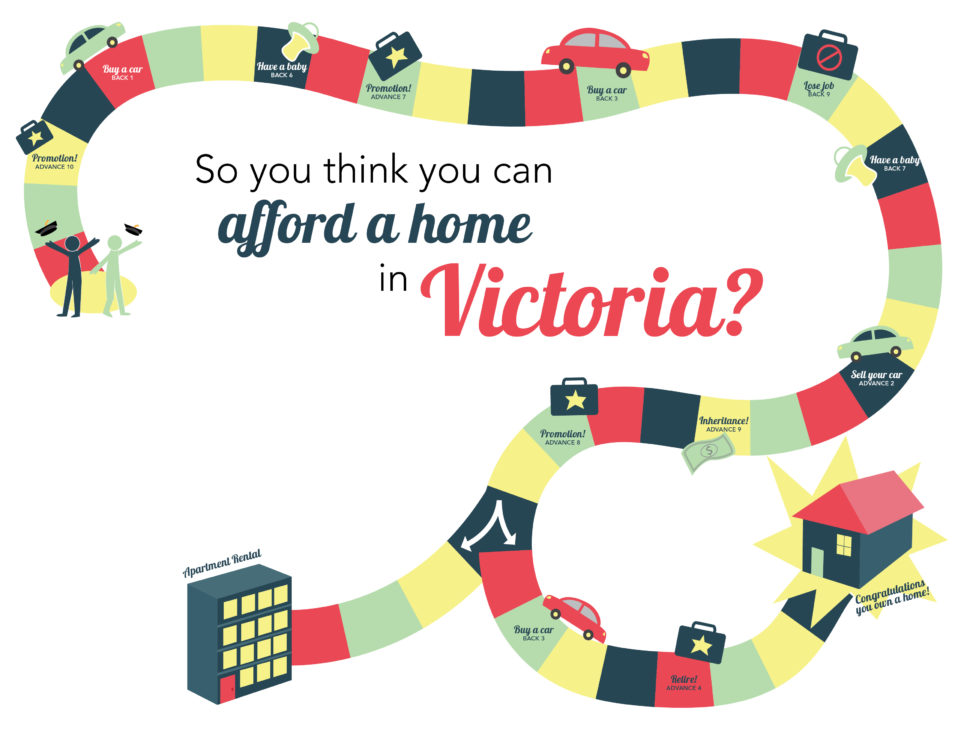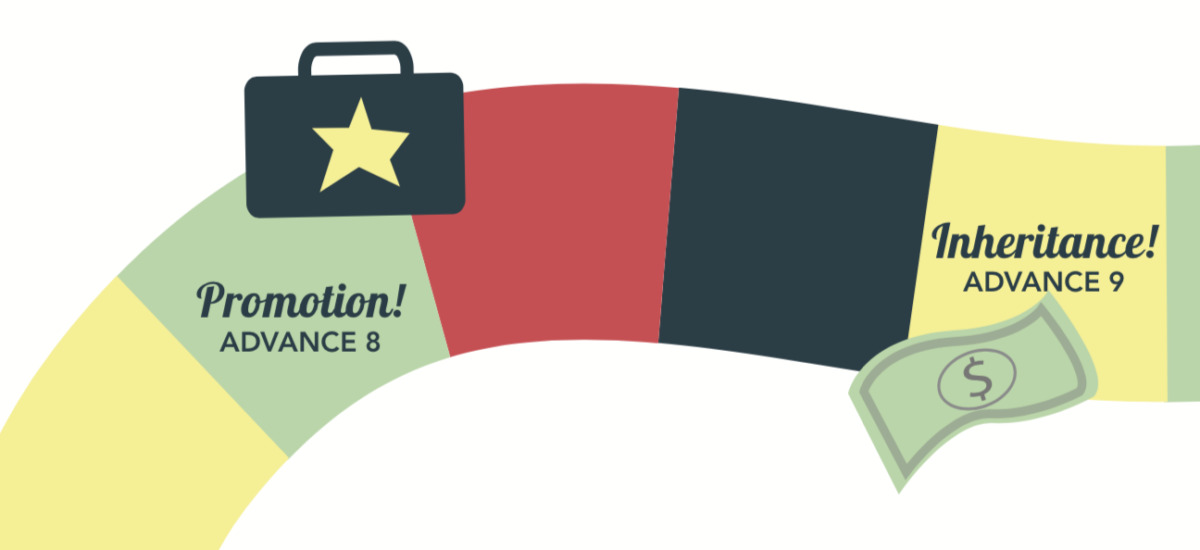Breaking down the costs of living after graduation in the city of the newly wed and the nearly dead

Imagine yourself three years post-undergrad with a steady job, a cozy 900-square-foot apartment, and one little car. By some miracle, you’ve managed to pay off your student loans, and date someone you love. In fact, you both pay rent together in that 900-square-foot space.
Now, while you’re imagining this, you’re likely adding up the costs of every part of this life and figuring out that you probably wouldn’t be able to afford it — that is, if this fantasy played out in the city of Victoria.
According to WorkBC, this imaginary couple in the 900-square-foot space would essentially be house poor — spending almost their entire income on living expenses. If they are both making the average amount for a UVic grad ($50-70K a year) in their jobs, they might have a thousand dollars left at the end of the year to put toward savings — whether they rent their apartment, or are making mortgage payments (assuming a 20 per cent down-payment on a $500 000 apartment).
This is an estimate based on the average cost of living, accounting for one car driving 15 km a day, no additional savings or investments, no student loans or other debt — so it’s not totally realistic.
This also assumes that they’d be able to find an affordable apartment. The average rent for Victoria is $1 400 a month, and the vacancy rate is a low 1.2 per cent. In the last year, the average rent climbed 7.5 per cent.
The cost of renting or owning an apartment might be slightly curbed by a new city regulation, which requires any new condominiums to have 20 per cent of their apartments designated as “affordable” — the definition being $850 for a studio unit, $1 050 for a one-bedroom, $1 300 for a two-bedroom and $1 750 for a three-bedroom.

Let’s catch up with that imaginary couple later in their lives and find out if they’d be able to afford buying a house. We’ll call them Celeste and Charles. Celeste and Charles have made the questionable decision to try to afford a house in Victoria, because they didn’t read this article.
But let’s just say that Celeste and Charles are making a comfortable $100 000 a year each, have two children, and are looking to buy a quaint family home. That home would likely cost around a million dollars, but Celeste and Charles have somehow accumulated savings while living in their 900-square-foot place by spending below the average cost of living and maybe — just maybe — they can afford it.
For the sake of making WorkBC’s cost-of-living calculator more accurate, we’ll say they are putting a conservative 10 per cent of their income into savings each month for their kids’ education and retirement. And we’ll say they’ve got two cars.
Running these numbers, Celeste and Charles’ expenses would exceed their income by $5 000 annually. This is accounting for a mortgage payment on a 1 500-square-foot home of around $5 500 per month, after an initial 20 per cent ($180 000) down payment on the house, and not accounting for any maintenance or insurance payments on their home, car, or life. If they were renting, they’d have $23 000 in annual savings. While renting, they would have to put savings away year after year to be able to afford to buy.
Over the last 40 years, housing prices in Victoria have gone up and up. In 1978, the average cost of a single family home was a mere $63 000 (this would equal $225 000 in 2020 when adjusted for inflation). Last year, the average selling price in Victoria for single family dwellings was $909 000.
A typical home buyer would pay a 20 per cent down payment on a home. With that current average selling price, they’d have to save about $140–$180 000 just for the down payment. The other 80 per cent of the home’s price would be mortgaged through a bank and paid back through monthly mortgage payments.
The expensive cost of living and the price of housing in Victoria means that people who don’t make enough and/or don’t come from inherited wealth can’t invest in a house as an asset.
Now, what if Celeste and Charles weren’t so fortunate? Let’s say they make just above minimum wage, $32 000 each a year, and rent their home in Victoria. Remember, Celeste and Charles have two kids, two cars, and put 10 per cent of their income away into savings.
Using WorkBC’s cost-of-living calculator again — adjusting the salaries and saying that they are renting their home — they can’t afford to live in Victoria. They would need another $17 000 dollars annually to afford their expenses.
If they’re really trying to save, they might not have any cars, not put anything away into savings, and rent something more in line with their budget. With the city’s latest regulation on affordable apartments, 20 per cent of new condominiums have to be affordable. If Celeste and Charles rented one of these properties, their rent would be $1 300 a month for a two bedroom apartment. Again, with Victoria’s vacancy rate, an apartment is still very hard to find.

This would be $15 600 a year in rent. Running these numbers, Celeste and Charles have about $10 000 dollars in annual savings. Even cutting their expenses, they wouldn’t be able to save for a home. At minimum, it would take them 14 years of putting all their savings towards that mortgage down payment of $140 000 — and then they would struggle to make their mortgage payments. Even saving for a 20 per cent down payment on a $500 000 condo would take 10 years.
Now you might be thinking, if they make $32 000 a year, why would they ever try to afford to buy a home in one of Canada’s most expensive city?
First of all, I don’t know Celeste and Charles. And rich or poor, I can’t tell you why they’ve made the questionable financial decision to raise a family here. Celeste and Charles aren’t real, and a couple making $32 000 would probably would not realistically try to save for a home that costs over $700 000.
The expensive cost of living and the price of housing in Victoria means that people who don’t make enough and/or don’t come from inherited wealth can’t invest in a house as an asset. And ultimately, wealth doesn’t accumulate with income. It accumulates through assets.
With the current price of property in Victoria, buying real estate is more available to the privileged. Simply put, buying property in Victoria is much easier for those with inherited wealth or above average pay cheques. The average UVic grad won’t be making 100K a year — they’ll make closer to $60 000. Even if you get a great start in your career and work your way up to that six-figure salary, affording a home in the city of Victoria would have to be a financial goal that you work towards over multiple years.
The city is a more affordable place to live if you’re able to split the rent as a young professional in a small rented space or save up all your life to retire here. But in a city so dependent on the tourist industry and service sector, we need people from diverse backgrounds and financial standings to be able to afford to live here. The housing prices are driving smart, young people elsewhere, and making Victoria live up to its old stereotype as “the city of the newly wed and the nearly dead.”







